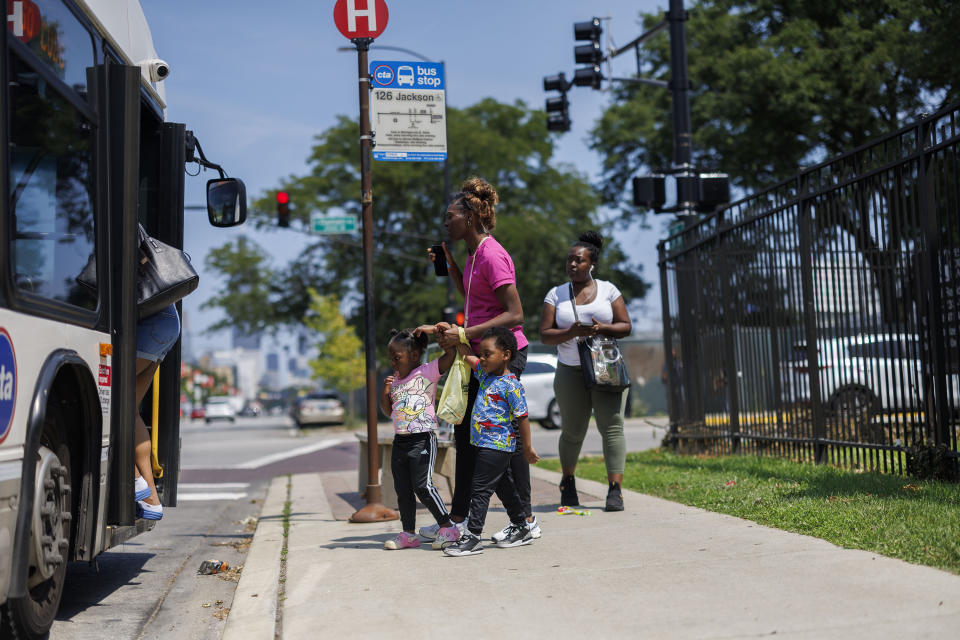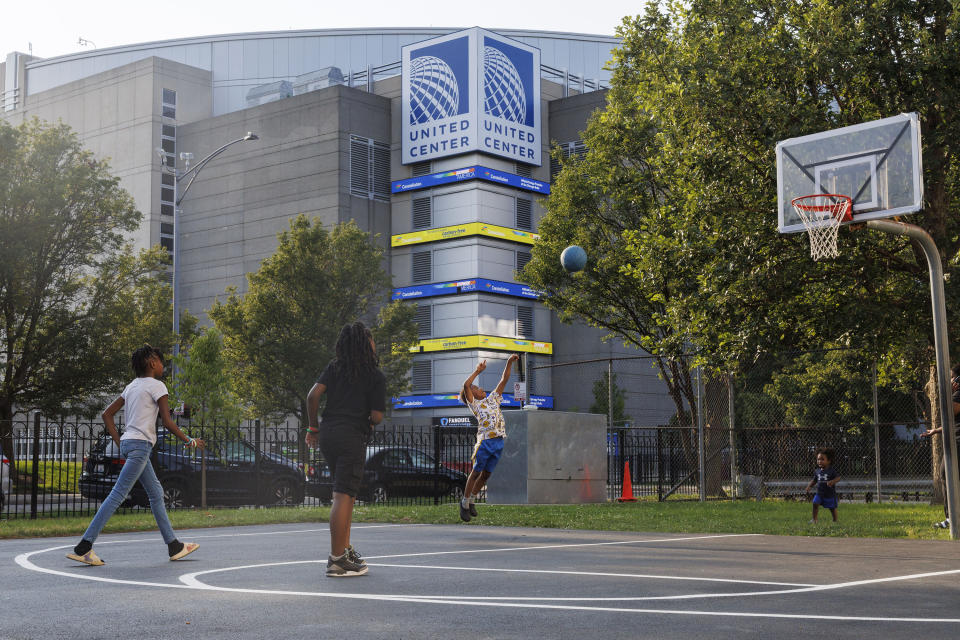‘No one asked’: Many West Side residents say they were left in dark about DNC plans
CHICAGO — For the past half-century, Dee Henderson has lived in an old brick house a few hundred feet from the United Center. Henderson, 66, has raised her children and grandchildren in the house. She’s hosted parties for Chicago Bulls victories and spent summers on her back porch, sipping her favorite cocktail — Tito’s vodka, orange juice, grenadine and Sprite — and watching her kids play in an above-ground pool in the parking lot that separates her house from the large arena.
But while the nation prepares for a Democratic National Convention in late August that will bring 50,000 delegates, staff and public officials to the United Center, the site of the prime-time speeches and events of the convention from Aug. 19-22, Henderson said she wants nothing to do with the politicians who will attend the event.
“None of them do what they promised to do in the first place,” Henderson said Wednesday. Local and federal authorities announced long-anticipated details of the planned security perimeter of the DNC Thursday, but nearby residents said they have felt left out of the planning conversation. They are worried about how the convention’s events could affect their transit routes and daily routines, feel distant from national politics and ignored in their communities.
According to a new map released by the city’s Office of Emergency Management and Communications, Henderson’s house, backyard and pool will be just feet from the “pedestrian-only restricted zone” separated by a fence.Following the city’s announcement Thursday, Henderson said she hadn’t heard about the perimeter. She said several officials came and knocked on her door in April to let her know that the political convention would be happening, but she hadn’t heard anything since then.
On Friday, the Secret Service, Chicago Police Department and other public safety officials canvassed the communities around the United Center, with the goal of providing residents with public safety, road closure and transportation information.
But with less than a month to go, dozens of residents around the United Center told the Tribune that they hadn’t heard about the major national security event happening in a matter of weeks, or if they had, they were confused about how it would impact them.
Ald. Walter Burnett, 27th, whose ward includes the United Center and the surrounding neighborhoods, attributed the confusion among residents to a disconnect between federal and local authorities. He described Secret Service messaging prior to Thursday’s news conference as “vague” and “very general.”
“Dealing with these federal people, being an alderman (doesn’t) mean much when the Secret Service gets involved,” Burnett said.
Residents have expressed to Burnett that they are unsure about what basic elements of their daily lives will look like during the convention, including commutes to work and visits from caregivers, he said.
Burnett himself lives on Paulina Street, which borders the outer vehicle screening checkpoint for the security perimeter. In the outer perimeter, streets will be closed and limited to screened vehicles that enter through a checkpoint.His elderly mother lives downstairs from him and relies on regular food deliveries from his nieces and nephews. He worries they may not be able to stop by during the week of the DNC.
On April 8, Secret Service began outreach around United Center and McCormick Place, the two major hubs of the convention. Their efforts reached more than 900 members of the public, representing over 500 organizations and businesses throughout the Chicago area, said Derek Mayer, deputy special agent in charge of Chicago’s field office for the Secret Service.
“The objective is to effectively communicate our plan and mitigate confusion to the greatest extent possible,” Mayer told reporters Thursday.
The event in Chicago will occur several weeks after the Republican National Convention in Milwaukee, where former President Donald Trump formally accepted his party’s nomination for president. Nick DeSiato, chief of staff for Milwaukee Mayor Cavalier Johnson said his team had been in communication with Chicago’s OEMC about how to run a safe and successful convention. DeSiato said Chicago was in line with Milwaukee’s communication timeline for outreach before the convention; they also released their security perimeter about a month before the event.“I liken it to being an umpire in a baseball game. When you do your job right, nobody’s talking about you,” he said.
Following President Joe Biden’s sudden exit from the race on July 21, the Democratic party is set to coalesce around Vice President Kamala Harris at the convention in August.
Outside the convention sites, tens of thousands of protesters are expected to gather in what has been a turbulent political month nationally. Several Chicago groups advocating for LGBTQ rights and against the ongoing war in Gaza, among other causes, have battled for months with the city over the right to hold demonstrations “within sight and sound” of the convention.
But after an assassination attempt on Trump earlier this month, the stakes for convention security, already high, were raised significantly.
Henderson said she’s prepared for any possible mayhem. She’s collected several blue wooden police barriers over years from events at the United Center and propped them up against her house in case she needs them, she said. “With everything going on in the world, no doubt there will be protests. But if they go up here, I’ll (have) something to say,” said Henderson, as she pointed to the area around the plastic pool behind her house where she said her grandson likes to cool off.
She said she has frequently been left in the dark by the city, so wasn’t surprised the perimeter would be so close to her property. She heard about recently announced $7 billion renovation plans in her neighborhood on TV, she said, and worries about city officials coming in to bulldoze her house without asking.
Angela Rathers, 51, who has lived in a Chicago Housing Authority public housing complex on the West Side since she was 3 years old, said “no one asked” people living at the complex how the convention will impact them. Her house is inside the outer vehicle screening perimeter.
“Residents of the Henry Horner homes will be able to access their homes and their entry instructions will be communicated directly to them during our canvassing efforts,” said Secret Service’s 2024 DNC coordinator Jeff Burnside to reporters Thursday.
Thursday evening, she said she had been informed by law enforcement officers that she wouldn’t be able to park on the street outside her home during the week of the convention. But Rathers has a 14-year-old daughter with a rare medical condition called Pierre Robin sequence that sometimes requires rushed trips to the hospital, she said.
“If there’s a medical emergency that week, I’m getting there. I’m going regardless,” Rathers said. “The CIA can give me a ride. I don’t care.”
Rathers said city officials started cleaning up the property this week to make it look presentable. They hung flower planters on the trees across the street, painted the fence around the property and paved the driveway.
“They’re spending all this money beautifying the area, you know, making us look happy,” Rathers said, as she sat in a patio chair overlooking the United Center through a freshly painted black metal fence.
Officials announced Thursday that CTA buses traveling through the perimeter will be significantly affected. Riders were asked to expect delays and budget extra time for travel.
Tonyanika Harris, 53, who lives near the United Center and commutes to work at different nursing homes and hospitals, said any road closures in the neighborhood would “most definitely” affect her ability to get to work.
“Most of the people that I know around here, they’re elderly,” Harris said. “They’re concerned about what kind of people (the DNC) is (going to) draw … they’re concerned about if they can access the hospital.”
Community centers and businesses outside of the perimeter said they were planning for limited schedule changes during the week of the convention, if any. Staff at the Manning Branch of the Chicago Public Library, on Madison Street one block west of the United Center, said it will be open with regular hours throughout the week of the DNC.
At the James R. Jordan Boys and Girls Club, staff will be undergoing training sessions that now may have to take place off-site, said Gabrielle Lothamer, communications manager. Two nearby schools said students would not be in session the week of the convention.
Following a Fourth of July holiday weekend in which more than 100 people were shot and at least 20 killed, some residents said they believed the increased security would be positive for their neighborhood.
William Bracy, a 71-year-old who lives about a mile west of the United Center, said he believed the large numbers of Secret Service personnel would make it feel safer to walk around.
“Hopefully it will feel better here,” Bracy said.
Martrice Allen, 38, pointed to holes in the mulch by some of the homes at Henry Horner. She said rats living by the driveway near the dumpsters in their yard had dug the holes after construction workers laid down new concrete. The rats didn’t have anywhere to go but closer to the residents’ homes, she said.
She said she didn’t want to be pessimistic but wondered: “We’ve lived here for all these years, why are they just fixing it up now?”
Her daughter, Martriana Jackson, 14, was valedictorian at her middle school. She said she looked forward to seeing so many police officers in person. “I’m not sure that happens every year, really,” she said.Jackson looked over at her little sisters playing basketball on a court dwarfed by the looming United Center complex.


